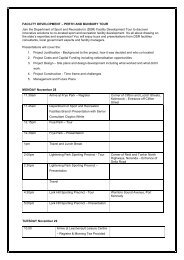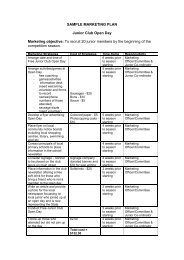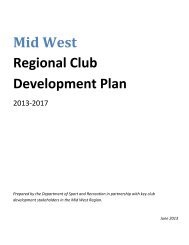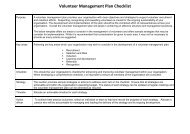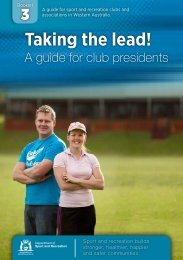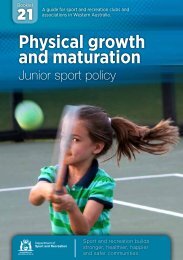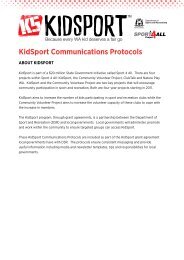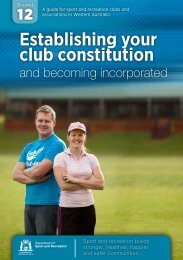Download Youth sport.pdf 1.47 MB - ClubsOnline
Download Youth sport.pdf 1.47 MB - ClubsOnline
Download Youth sport.pdf 1.47 MB - ClubsOnline
You also want an ePaper? Increase the reach of your titles
YUMPU automatically turns print PDFs into web optimized ePapers that Google loves.
Booklet18A guide for <strong>sport</strong> and recreation clubs andassociations in Western Australia.<strong>Youth</strong> <strong>sport</strong>Junior <strong>sport</strong> policySport and recreation buildsstronger, healthier, happierand safer communities.
IntroductionIn May 2002 the Department of Sport andRecreation (DSR) conducted a workshopof key stakeholders within youth <strong>sport</strong> todiscuss issues and strategies to enhanceyouth <strong>sport</strong> programs in WA.The workshop identified the difficulty ofretaining youth in their <strong>sport</strong> as a major issue.Research into the drop-out rates of youthfrom <strong>sport</strong> echoes these concerns.• A survey of WA school children in1996 (Taggart and Sharp) found thatalthough 80 per cent of children aged11–12 participated in <strong>sport</strong>, by the timethey reached 16–17 years the figures haddropped to 57 per cent. These figuresincluded school, club and social <strong>sport</strong>.• This survey also acknowledged that ofthe total number of youth who droppedout of <strong>sport</strong>, 42 per cent did so duringthe transition between Years 7 and 8.• More recent research indicates thesetrends are continuing. At the endof 2003 a large scale survey of WAchildren’s physical activity levels and<strong>sport</strong>s participation was conducted bythe Physical Activity Taskforce.To ensure <strong>sport</strong> is attractive to youngpeople, organisations delivering youth <strong>sport</strong>must fully understand why young peopleparticipate in and drop out of <strong>sport</strong>.This resource provides some simpleguidelines for making <strong>sport</strong> more youthfriendly,as well as showcasing initiativesthat have successfully addressed youthparticipation.Why do young peopleplay <strong>sport</strong>?• Fun and socialisation – many are drawnto organised club <strong>sport</strong> through friends,and value the sense of belongingassociated with the club.• Physical, emotional and mental benefits(e.g. enhanced physical fitness andability to deal with stress).• Learning new skills.• Being part of a team andworking together.Why do they dropout?• Time clash with other activities(i.e. leisure, social or work).• The <strong>sport</strong> becomes boring.• Conflict with study and workcommitments.• Over-emphasis on winning bycoaches or parents.• Change to another <strong>sport</strong>.• Tran<strong>sport</strong> difficulties, costs.• Young person experiences orwitnesses bias or discrimination.Listening is the keyTo continue the success of your junior<strong>sport</strong>ing club it is important that you listento what youth are telling you and adapt yourprograms so that they are relevant to theyouth market. It is not always easy to moveaway from tradition, but there are a numberof simple changes that you can make to yourclub that will make it more youth-friendly.2
Checklist(Adapted from Team Vol 4, Issue 5, Nov2002).Ask participants what theywant from <strong>sport</strong>Be flexible.• Be prepared to change:• length and timing of season;• times of training and games;• length of games;• rules; and• clothing requirements.• Consider young people’s study and workcommitments.• Consider working parents and theirschedules.Reduce the competitiveelement and enhance the funaspect of your <strong>sport</strong>• Discuss with the club, coaches andparents the positives of focusing onparticipation rather than the result.• Develop and promote policies of equality– equal field time for all.• Focus on developing each individual toachieve his/her best.• Ignore premiership points and fairestand best trophies for primary-agedcompetitors.• Improve professionalism by providingcoaching courses to all junior coaches.Revitalise the social aspectProvide opportunities for members to bringfriends to the club.• Gear social functions to the youth agegroup – get their input.Provide learningopportunities for allvolunteers• Provide opportunities for youngmembers and parent volunteers toacquire and practice coaching, officiatingand administrative skills. This will buildindividual confidence and enhance thequality of the program you’re delivering.Facilitate tran<strong>sport</strong>• Organise car-pooling between membersand parents.Offer different pathways forcompetition and participation• Twilight, mid-week or shortenedcompetitions.Provide a link betweenjunior and senior clubWhen working with schools:• coincide school clinics with the schoolphysical education program;• shorten seasons to coincide with schoolterms; and• run shortened programs in schools priorto registration dates.Provide a welcomingenvironment• Use a young, existing member towelcome all new youth members.• Provide for, support and engage parents.3
Good practiceexamples — <strong>sport</strong>The following are examples of programsthat have proven to be successful inimplementing youth-friendly strategies.They were collected from a variety oforganisations and reflect the great workbeing done in the community.You are free to contact these organisations ifyou need further information.Incentive scheme/certificateprogram (squash)Problem:Squash WA identified a lack of junior playersregistering for tournaments due to theperceived elitism associated with tournamentevents. They needed to implement aprogram that would attract and retain thenon-elite junior squash player.Program:A certificate program was established in 2001based on skill development and knowledgeof the game. Six levels were created tocater for kids aged 7–16. Kids move on tothe next level once they have fulfilled therequirements of the previous level. Anindependent coach conducts assessments.The program is run at the club level. Thestate <strong>sport</strong>ing association (SSA) providesadministrative support in the form ofregistering the players and providing thecertificates. The SSA secured sponsorship forthe program that pays for a logo t-shirt toaccompany each level.Events (modified tournaments) are organisedthat allow the same level kids to play againsteach other. These events are a lot shorter andmore social than tournament play.An extra step following the certificates isthe Platinum Rating that incorporates theadministration side of the <strong>sport</strong>. Satisfyingall this criteria entitles the participant to a50 per cent subsidy on a Level 1 CoachingCourse.The program and its levels are reassessedevery six months.Benefits:• Thirty per cent increase in registeredjunior players.• Increased numbers participating intournaments.• Improvement in skill levels.• Assists coaches in planning progress oftheir players.• Provides developmental feedback forparticipants.• Increased motivation of participants.Contact:Squash WA on 08 9225 7255.4
Linking with the schoolcurriculum (rugby league)Problem:Introducing an unfamiliar <strong>sport</strong> to primaryschool children. Increased demands onschool teachers to deliver quality <strong>sport</strong>programs.Program:A CD-ROM entitled ‘Pass, Catch, Kick’was developed by the Australian RugbyLeague Foundation to meet the educationaloutcomes for each primary school age group.Eight sequential lessons for each age groupare outlined in both diagrammatic and videoformat.Also included are teaching notes for eachexercise, equipment needs and exercisevariations.Each lesson is broken down into warmupexercises, skill acquisition and skillapplication. Each lesson prints out in a onebuttonprocess.The exercises included are all fun or gamesbasedrather than being simply drills.Benefits:• Provides fun activities to developfundamental skills of passing, catchingand kicking for primary-aged children.• Provides teachers a user-friendlymeans of providing lessons that meeteducational outcomes.• Rugby league increases and enhancesthe delivery and development of their<strong>sport</strong> throughout the state.• The CD-ROM is complimented withteacher in-servicing.Contact:WA Rugby League on 08 9228 9275.Tracking participantinformation (netball)Problem:WA Netball wanted to be able to passon local information about clinics andcompetitions direct to interested youngnetballers.Program:Schoolnet Membership Program – databaseof primary school participants.Every student who participates in aschool-based netball program is given amembership form that is completed andreturned to WA Netball. Each membershipreceives three passes to West Coast Fevergames.Benefits:• Improved communication lines byallowing information to be passeddirectly to interested participants aboutspecial events, clinics etc. in their area.• Database of interested primary schoolparticipants established.• Assists with funding opportunities.• Provides opportunity to connectparticipants to their local clubs,developing links between the schoolsand the local netball association.Contact:5
WA Netball on 08 9380 3700.Improving transition fromschool program to clubprogram (tennis)Problem:TennisWest identified that even though theyhad large numbers participating in theirschools program, they did not enjoy muchsuccess in attracting these participants intoclub programs.Program:A four-staged process was introduced:• Stage 1 – School visit by local club coachproviding tuition and show bag forstudents, Level 0 coaching course forteachers and website competition.• Stage 2 – Free fun day at local clubto introduce students to the clubenvironment.• Stage 3 – Inexpensive three-weekintroductory club coaching program.• Stage 4 – Rolling eight-week clubcoaching program with a strong focus onskill development. Six certificate levelsfor achievement.Benefits:TennisWest achieved a 10 per cent uptakefrom the school visit to the free fun day atthe club and a 75 per cent uptake from thefree fun day to the three-week club coachingprogram.Tennis West also experienced increasedretention rates from their rolling eight-weekcertificate program. It also provides feedbackand incentives to the participants.Contact:Incorporating school and clubteams (volleyball)Problem:Rossmoyne Volleyball Club needed toincrease its junior numbers.Program:Approached local high school as to how theclub and school could unite forces so bothgroups benefited.School teams play in the club competitionunder the club name allowing participants toplay with their friends.Older players coach the younger age groups(education outcomes).Training occurs after school, at school andgames on the weekend.Benefits:• Training sessions are at the school (easyaccess for participants).• Discounted gym hire (greater use offacilities).• Club purchases balls for both club andschool to use (sharing resources).• Club provides coaches for school teamsand national competitions.• School uniform is club uniform (saves oncosts).• Club members who coach schoolteams get discounted fees (encouragevolunteerism).Contact:Melville Volleyball Club on 08 9288 8522.TennisWest on 08 6462 8307.6
Retaining non-competitiveparticipants(Royal Life Saving)Problem:Losing children that no longer want thestructure of swimming and water safetylessons and are not interested in thecompetitive nature of squad swimming.Program:The Junior Lifeguard Club providesalternatives for these participants withthe emphasis on fun while maintainingstrong club feelings and loyalties. Programopportunities include swimming skills,fitness, competition, life saving knowledge,leadership, teamwork and communityeducation programs. Members record theirachievements in their personal waterlog.Benefits:• Friends can join together and notbe differentiated on the grounds ofperformance.• Awards and feedback on individualprogress is provided.• Results in members becomingcompetent in swimming and lifesaving skills while participating in anatmosphere that is fun.• Retains non-competitive participantswithin the club structure.Contact:Royal Life Saving Society on 08 9383 8200.Promoting junior programthrough schools (touch)Problem:No junior competitions were being runfor young competitors by the local touchassociations.Program:The state body worked with each localassociation to tailor a schools programspecific to their situation. Each programwas based on a 10-week course coincidingwith the school term, focusing on skilldevelopment and concluding with acompetition.Cost was kept to a minimum and coveredaffiliation and insurance. The program wasconducted at the association grounds oneafternoon a week. The local associationprovided coaching and the state body hada representative present as professionalsupport and to talk with parents.The state body promoted the program bysending letters to PE teachers and flyersspecific to each program to the schoolswithin the area. Flyers emphasised the funfactor of the course, including lucky dipprizes for the kids.Benefits:• First program received 31 enrolments.• Increased volunteer base, as parentswere eager to get involved.• Parents were happy to get involved as itdidn’t interfere with school holidays.Contact:TouchWest on 08 9319 4600.7
Facilitating transition fromjunior to senior ranks(University Hockey Club)Problem:The University Hockey Club found a largenumber of players were lost or disenchantedduring the transition from junior to seniorcompetition.Program:A program was introduced to ensure asmooth transition between junior and seniorranks:• Senior coach regularly attends juniortraining and games.• Club captain speaks to the juniorsoutlining the make up of the seniorteams and the opportunities availableto them the following year (social vscompetitive).• Development team of juniors enteredinto a senior competition.• Opportunity provided to train with thesecond top senior side.• Junior training times immediatelyprecede senior training.• Top squad members coach junior grades.• Personal invitation to senior pre-seasonand trials.Benefits:• Junior members already feel part of thesenior club as they are familiar with theirteammates and routine.• Junior members have been madewelcome and aware of the opportunitiesahead of them, so are informed to maketheir own decision.• Senior members’ involvement with thejunior teams promotes volunteerismculture within the club.Contact:University Hockey Club on 08 9383 9652.8
Retention strategies (SouthWest Football League)Problem:Large drop-out rates between juniors andcolts in the South West region of WA.Program:The Football Development Trust(FDT) commissioned a researchproject to investigate drop-out rates.Recommendations from the report included:• Where the likelihood of an unevencompetition is identified, the juniorassociations undertake to split theage level into two divisions (aim: evencompetitions).• Increase access to elite players (WAFL)to attend training sessions and juniorclub functions (aim: role modelling).• That colts coaches and senior playersregularly attend junior training sessionsand hold joint training sessions with coltsand under 16 teams towards the end ofthe season (aim: ease transition).• Provide appropriate joint senior/juniorsocial functions for last year juniorplayers (aim: ease transition).• That senior players be selected asmentors to support and provide adviceto last year junior players (aim: rolemodelling).Benefits:Surveys, workshops and interviews withyouth and other key stakeholders wereconducted to investigate reasons whyplayers do not continue with their footballonce they have completed junior football.The data obtained provides the league withrelevant information and issues on which theSouth West Football League can formulatefuture directions that are relevant and caterfor young peoples’ needs.Contact:FDT South West on 08 9721 7878.9
Good practiceexamples — localgovernmentThe following are examples of programsimplemented by local government that haveproven to be successful. They were collectedfrom a variety of organisations and are noway exhaustive of the great work being donein the community. All contributors werehappy to be contacted by those wishing toget further information.Recreational equipmentvoucher scheme (Town ofKwinana)Problem:Access to youth <strong>sport</strong>s for financiallydisadvantaged families.Program:The scheme aims to assist low-incomefamilies to access junior <strong>sport</strong>s. Thevouchers allow ratepayers to nominate$3.50 of their rates directly to a participatingjunior organisation to help them purchaseequipment. The Kwinana CommunityRecreation Development Trust (KCRDT)manages the scheme.The role of the KCRDT is to act as a liaisonbetween the council and local recreationclubs and organisations. Research foundthe high cost of participation to familieswith more than one child was a barrier. TheRecreation Voucher Scheme was devised asa strategy to assist parents and clubs withthe cost of junior <strong>sport</strong>.The Town of Kwinana sets aside a fund tofacilitate the Recreation Voucher Scheme.The vouchers are distributed along withthe annual rate notice. When all rates arereceived the face value of vouchers foreach club is calculated and a cheque sentto the club. Clubs must provide an annualstatement of how funds have been spent.Benefits:Local clubs are provided with financialassistance to provide equipment for juniorparticipants. It has shown to be of greatbenefit to an area that has a low socioeconomicpopulation. The Town of Kwinananow has a high proportion of participatingjuniors. Juniors also have the opportunityto try new <strong>sport</strong>s because fees are kept to aminimum.The scheme has proved to be very popularwith both clubs and ratepayers. When thescheme first started there was a budget of$4,000 and 16 participating clubs. This hasgrown to 24 clubs and a budget of $15,000.It has enjoyed continued support fromratepayers and council.Contact:Manager Community and RecreationServices, Town of Kwinana on 08 9419 2222.10
Calunga Aboriginal School<strong>sport</strong>s program (City of Swan)Problem:Access to <strong>sport</strong> programs and facilities forstudents of Calunga Aboriginal School.Program:Altone Park Leisure Centre (City of Swan)and Calunga Aboriginal School havedeveloped a term program to provide <strong>sport</strong>sand coaching lessons for students of theschool. A variety of <strong>sport</strong>s and activities runfor 4–5 weeks each and then change to anew <strong>sport</strong>. The program caters for up to 40students from 5–14 years of age.Altone Park Leisure Centre provides courtspace and a minimum of two instructors witha third on standby if required. The <strong>sport</strong>sare chosen to coincide with seasonal <strong>sport</strong>s.Instructors conduct coaching and games onthe program.Benefit:The program has been operating sinceOctober 2001. Staff are now looking atincorporating aquatic programs.Contact:Program Development Officer,Altone Park Leisure Centre,City of Swan on 08 9267 9040.Access ALL Areas (City ofSwan)Problem:Access to youth <strong>sport</strong>s for disadvantagedyouth.Program:Access All Areas is the operational name forthe City of Swan’s <strong>Youth</strong> Recreation Fund.It is a flexible and responsive way to targetindividual barriers that inhibit or excludeyoung people from participating in recreationand leisure activities.How does it work?• Organisation identifies a young personwho cannot equitably access normalrecreational activities.• Organisation and young person refer tothe Access All Areas Activity Register toconsider available options.• An Access All Areas Pass is issued.• Young person presents the pass as validtender for the chosen activity.• Recipient service provider invoicesthe City of Swan for the total value ofpasses received.• Invoice paid by City of Swan.Benefits:• Increase opportunities for youngpeople to recreate where barriers toparticipation exist.• Increase health, wellbeing, skilldevelopment and sense of communityfor young people.• Overcome significant barriers thatcontribute to income inequalities.11
• Improve coordination andcommunication between youthagencies, recreation providers,community groups, government andlocal businesses.• Improve the general level ofunderstanding and acceptance ofyoung people within the community.Contact:Program Development Officer,Altone Park Leisure Centre,City of Swan on 08 9267 9040.How localgovernments areassisting junior <strong>sport</strong>• Provision of small grants to <strong>sport</strong>ingorganisations wishing to develop newyouth initiatives (City of Nedlands).• Provision of small grants to individualathletes who are selected in state ornational teams (City of Joondalup, Cityof Swan, City of Melville).• Establish a community fund to provideone-off grants for equipment and startupcosts for junior <strong>sport</strong> groups (jointventure between City of Swan, LWP P/Land Ellenbrook Community Committee).Program development• Council Recreation Officers assistschools within the area to design, accessand conduct junior <strong>sport</strong> programs (Cityof Joondalup).Easy access to facilities foryouth <strong>sport</strong>s• Introduction of policy that junior <strong>sport</strong>ingteams can have use of the councilbuildings or active recreation areas freeof charge (City of Nedlands, Joondalup,Town of Kwinana).• Introduction of policy that school groupscan use their active recreation areasfree of charge prior to 3:30pm (City ofNedlands).Recognition and support ofjunior athletes and <strong>sport</strong>ingclubs• Annual Sports Club Awards thatrecognise both individual achievementand junior club management (City ofNedlands).• Provision of scholarships to youngathletes of free access to localgovernment’s recreation facilities (City ofMelville).12
Further information and resources<strong>Youth</strong> <strong>sport</strong> organisations offer valuable opportunities for the youth of WA. They are generallyrun by hard-working, committed volunteers with the goal of providing the same life enrichingexperiences that they themselves were given in their youth. However it must be realised thatthe lifestyles and pressures on youth today have changed and that these changes must bereflected in the programs our industry delivers.By understanding the varied issues accompanying youth participation in <strong>sport</strong> and by sharinginformation and ideas, youth <strong>sport</strong> organisations can successfully modify their programs andprovide relevant and vibrant <strong>sport</strong> programs for the youth of today.This resource is a collation of some of the successful programs many <strong>sport</strong> groups have alreadyimplemented that your organisation can adapt. Listed here are further resources and websiteswhere you can get more ideas and assistance to deliver successful youth <strong>sport</strong> programs.Australian Sports Commissionwww.au<strong>sport</strong>.gov.au• Kelloggs Ready Set Go• Sport Start• Sport It• Your Kids, Their GameVictorian Department of Sport and Recreationwww.<strong>sport</strong>.vic.gov.au• User-friendly Sport – An ideas book to help <strong>sport</strong> and recreation clubs growWA Disabled Sports Associationwww.wadsa.org.au• Willing and AbleSports Medicine Australiawww.<strong>sport</strong>.net.au/smawaPlay By the Ruleswww.playbytherules.net.auArts Sport Recreation Industry Training Councilwww.asritic.com.auWhat can you do?As a proactive member of your club you can take on board the ideas and programs relevant toyour organisation and adapt them to suit your specific needs. Clubs are only as vibrant as thepeople they have on board!13
Other resourcesThis resource is part of the Club Development Officer Scheme, which provides assistance toWestern Australian <strong>sport</strong> and recreation clubs and organisations to become better managed,more sustainable and to provide good quality services to members and participants.Other resources in the series include:1 Step-by-step to starting a new club2 Planning for your club – The future is in your hands3 Taking the lead! A guide for club presidents4 The key to efficiency – The club secretary5 Show me the money – A guide for the club treasurer6 Effective club meetings – A guide for the chairperson7 Take the ‘in’ out of ineffective – 10 steps to running successful meetings8 Lighten the load and delegate – Help for the overworked committee member9 You have the answers – Solving club problems10 Marketing and promoting your club11 Sponsorship – Seeking and servicing a sponsor12 Establishing your club constitution and becoming incorporated13 Risky business – A club guide to risk management14 Clubs’ guide to volunteer management15 Member protection for clubs16 How to be more inclusive of people from diverse backgrounds17 Pas<strong>sport</strong> into schools – Linking <strong>sport</strong>s with schools18 <strong>Youth</strong> <strong>sport</strong> – Junior <strong>sport</strong> policy19 Long-term involvement – Junior <strong>sport</strong> policy20 Getting young people involved – Junior <strong>sport</strong> policy21 Physical growth and maturation – Junior <strong>sport</strong> policy22 Sport pathways – Junior <strong>sport</strong> policy23 Forming links – Junior <strong>sport</strong> policy24 People making it happen – Junior <strong>sport</strong> policy25 Quality coaching – Junior <strong>sport</strong> policy26 Making <strong>sport</strong> safe – Junior <strong>sport</strong> policy27 The law and <strong>sport</strong> – Junior <strong>sport</strong> policy28 Top 20 tips for officials29 Top 20 tips for successful coachingYou will find the full series of the booklets on the Department of Sport and Recreation’s<strong>ClubsOnline</strong> website: www.dsr.wa.gov.au/clubsonline14
<strong>ClubsOnline</strong><strong>ClubsOnline</strong> www.dsr.wa.gov.au/clubsonline is the place for <strong>sport</strong> and recreation clubs inWestern Australia to communicate with other clubs, the Department of Sport and Recreationand Club Development Officers. It provides clubs with an opportunity to share ideas andaccess useful club-related resources.Some of the resources you will find on <strong>ClubsOnline</strong> include:• Find a Club, which helps you search for and contact clubs in your area.• Free club website. Simply register with Find a Club and your club will be eligible for itsown simple-to-build website.• Club self assessment tool.• Volunteers exchange to browse for ‘clubs seeking volunteers’ or post your own noticeunder ‘volunteers seeking clubs’.• Find my Club Development Officer. The Club Development Officer Scheme is apartnership with local governments across Western Australia to build the capacityof community-based clubs. A statewide network of Club Development Officersassists, supports and develops community based <strong>sport</strong> and recreation clubs througheducation, facilitation and communication.• Clubhouse resources including booklets, useful documents to download and aselection of podcasts.15
Metropolitan246 Vincent StreetLeedervillePO Box 329, Leederville WA 6903Telephone (08) 9492 9700Facsimile (08) 9492 9711Email info@dsr.wa.gov.auGascoyne4 Francis Street, CarnarvonPO Box 140, Carnarvon WA 6701Telephone (08) 9941 0900Facsimile (08) 9941 0999Email gascoyne@dsr.wa.gov.auGoldfields106 Hannan Street, KalgoorliePO Box 1036, Kalgoorlie WA 6430Telephone (08) 9022 5800Facsimile (08) 9022 5899Email goldfields@dsr.wa.gov.auGreat Southern22 Collie StreetAlbany WA 6330Telephone (08) 9892 0100Facsimile (08) 9892 0199Email greatsouthern@dsr.wa.gov.auKimberleyBroomeUnit 2, 23 Coghlan Street, BroomePO Box 1127, Kununurra WA 6743Telephone (08) 9195 5750Facsimile (08) 9166 4999Email kimberley@dsr.wa.gov.auKununurraGovernment OfficesCnr Konkerberry Driveand Messmate Way, KununurraPO Box 1127, Kununurra WA 6743Telephone (08) 9166 4900Facsimile (08) 9166 4999Email kimberley@dsr.wa.gov.auMid WestMid West Sports House77 Marine Terrace, GeraldtonPO Box 135, Geraldton WA 6531Telephone (08) 9956 2100Facsimile (08) 9956 2199Email midwest@dsr.wa.gov.auPeelSuite 3, The Endeavour Centre94 Mandurah Terrace, MandurahPO Box 1445, Mandurah WA 6210Telephone (08) 9550 3100Facsimile (08) 9550 3199Email peel@dsr.wa.gov.auPilbara2/3813 Balmoral Road, KarrathaPO Box 941, Karratha WA 6714Telephone (08) 9182 2100Facsimile (08) 9182 2199Email pilbara@dsr.wa.gov.auSouth West80A Blair Street, BunburyPO Box 2662, Bunbury WA 6231Telephone (08) 9792 6900Facsimile (08) 9792 6999Email southwest@dsr.wa.gov.auWheatbeltNortham298 Fitzgerald Street, NorthamPO Box 55, Northam WA 6401Telephone (08) 9690 2400Facsimile (08) 9690 2499Email wheatbelt@dsr.wa.gov.auNarroginGovernment OfficesLevel 2, 11–13 Park Street, NarroginPO Box 54, Narrogin WA 6312Telephone 0429 881 369Facsimile (08) 9881 3363Email wheatbelt@dsr.wa.gov.au



